Lab Members
Tere Davidson
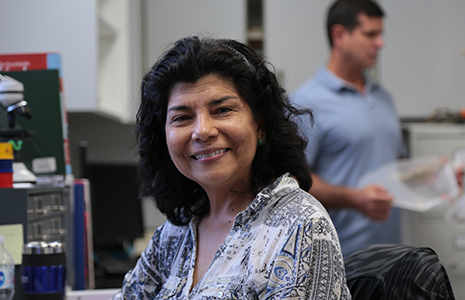
Tere is in a Ph.D. program at the Department of Environmental Horticulture, University of Florida and her project topic is seed production with emphasis in the physiology of seed development, desiccation tolerance, and aging stress tolerance. Her project includes social research and outreach to enhance seed production for farmers in the region. Tere is a biologist who worked as a research assistant at the International Center of Tropical Agriculture -Bean Breeding Program (CIAT, Cali, Colombia) . She obtained a M.S. in Crop and Soil Science from Michigan State University (East Lansing, MI) with a research thesis focused on the dry bean seed development and nutrition incorporated to a breeding program. She also worked as a research assistant at the University of Michigan, Department of Ecology and Evolutionary Biology (Ann Arbor, MI).
Amber Gardner
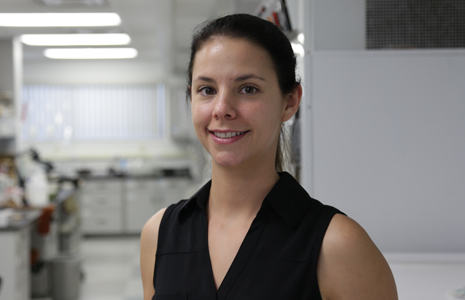
Amber graduated from UF with a Bachelor of Science degree in Wildlife Ecology and Conservation in 2008. After working with the Florida Fish and Wildlife Conservation Commission’s Upland Habitat Research and Monitoring Program for nearly seven years she returned to UF to pursue a Master of Science degree in Environmental Horticulture in 2015. Amber’s research interests are centered on native plant conservation and restoration. Her current research focuses on the seed biology and germination ecology of Harperocallis flava, a federally endangered species that is endemic to the central panhandle of Florida. By employing both lab and field based approaches, she hopes to answer questions regarding seed dormancy, viability, germination timing, and seed banking potential of this rare species.
Nicholas Genna
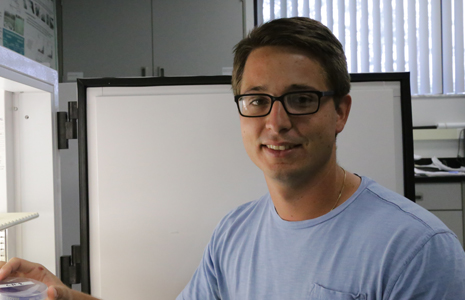
Nicholas obtained a B.S. in Biology and a M.S. in Horticultural Sciences from the University of Florida. Nicholas’ background in biology is a driving force behind his motivation to ask basic scientific questions that address current research gaps in seed biology. One such gap is the potential for a within-species mass-based aging response in seeds. Nicholas’ Ph.D. research focuses on how intraspecific seed mass variation modulates in situ and ex situ seed deterioration. Nicholas’ work has implications for understanding how seed mass contributes to microevolution in plants and viability loss in long-term storage. Nicholas hopes to work in some capacity to conserve resources and biodiversity by advancing mankind’s scientific understanding of the natural world.
Andres Ochoa
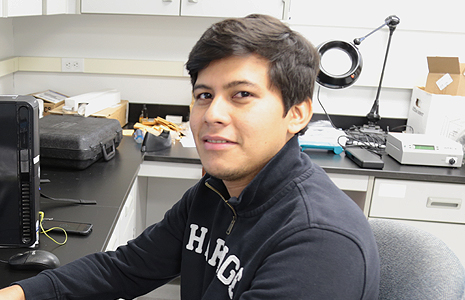
Andres earned an Agricultural Sciences bachelor’s degree from Escuela Superior Politecnica del Litoral (ESPOL, Guayaquil, Ecuador) in 2012. Andres then worked as a researcher at Centro de Investigaciones del Biotecnológicas del Ecuador (CIBE). At CIBE Andres worked on project related to cocoa, coffee and rice. He also collaborated on projects investigating the influence of organic fertilizers on crop production and entomology. Andres worked as a visiting scientist in the Seed Lab during the fall of 2015 and began as a Master’s student in the fall of 2016. Ecuador is a biodiverse country but also faces challenges related to conservation of native flora. Andres is interested in learning more about the intersection of seed biology and endangered plant conservation so that he can become a leader in this field in Ecuador.
Tia Tyler
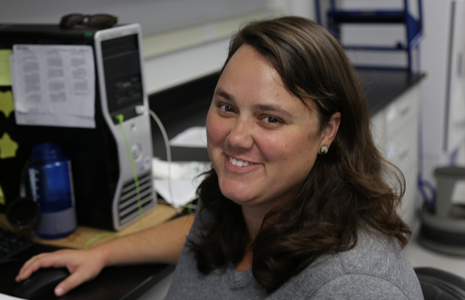
Tia is a Florida native who earned her B.A. in Interdisciplinary Studies from The Evergreen State College. Following her undergraduate degree, she gained a diversity of work experience in both the non-profit sector and horticultural businesses. She returned to Florida to complete a M.S. in Environmental Horticulture and is currently working toward her Ph. D. Her research interests focus on quantifying variability of seed quality to highlight its role in efficient seed use.
Dr. Hector Pérez
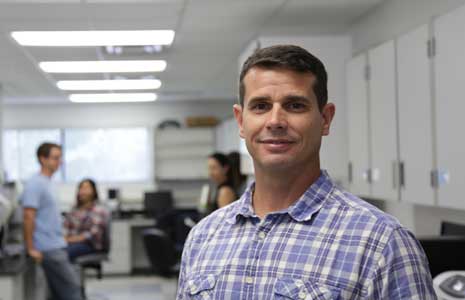
Dr. Pérez’s research program takes an interdisciplinary approach blending seed biology with plant restoration and endangered species conservation. Dr. Pérez collaborates with conservation and restoration practitioners, land managers and native plant producers throughout the region in an effort to improve conservation and restoration outcomes. Dr. Pérez also works closely with the Florida wildflower seed industry to enhance wildflower seed biology knowledge thereby enhancing opportunities for this expanding agricultural sector.
Join the lab group - Dr. Pérez enjoys actively mentoring and working with group members to guide their development as professionals. Graduate students and undergraduate research associates in the Seed Biology Research Group have worked collaboratively with Dr. Pérez to published their work in respected journals, present at scientific meetings, and develop stimulating research projects. Group members have also been actively involved in course development and teaching.
Prospective students should:
- Be interested in using the scientific method, fieldwork or other quantitative methods to test novel hypotheses in basic and applied aspects of seed biology
- Be interested in the application of their results to conservation and restoration of biological resources
- Be interested in evolving as professionals, scientists and educators
- Be eager to work in a stimulating and collegial academic environment
- Actively pursue fellowships and financial support for their work
- This is not only good practice for the future, but earning grants and fellowships while in graduate school makes you a much stronger candidate for jobs after you have graduated
- Get along well with others and have a positive outlook
Interested in joining? Contact Us.
Follow us on Instagram

